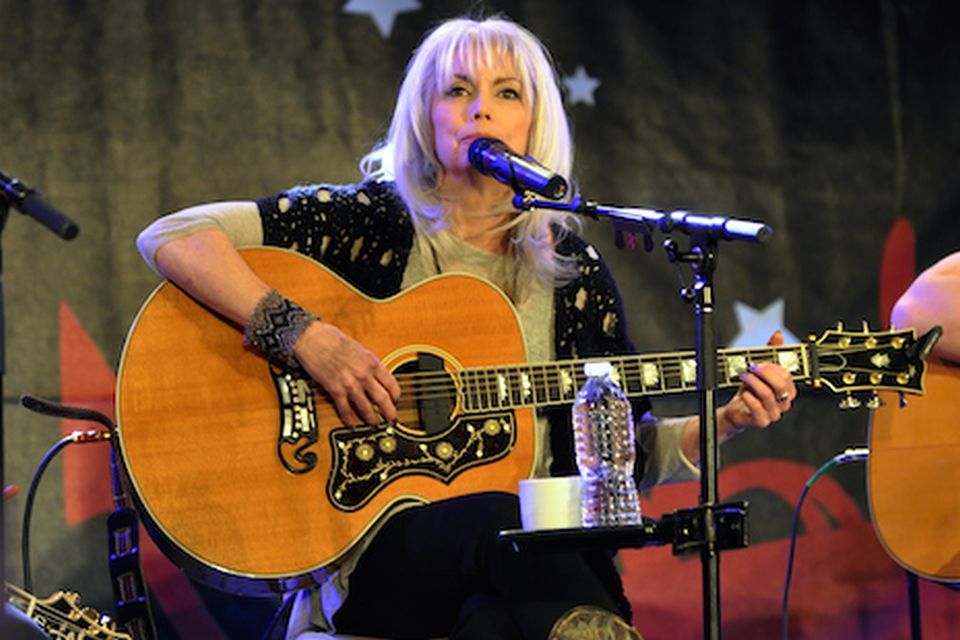“How can we see so much pain and suffering and think that it’s normal?” asks American singer Emmylou Harris about the needs of refugees across the world.
Last November, on the 35th anniversary of the Jesuit Refugee Service, Pope Francis urged an organization close to his heart to put “mercy in motion.” So much is taken from those who flee their homelands for desperate reasons.” But one thing that cannot be taken away, the Jesuit pope stressed, is an education.
As a result, JRS launched its Global Education Initiative in the 2016 Year of Mercy. It is gearing up to make a lifeenhancing impact on tens of thousands of refugees in the 45 countries where JRS has operations. The pontiff, whose love for refugees was underscored when he brought to the Vatican a Syrian family from Greece in April, also issued a challenge: double the number of global refugees served to 220,000 by 2020 with JRSsponsored educational projects.
“Schools are a place of freedom, (keeping) alive the flame of hope,” Pope Francis said last fall. “To give a child a seat at school is the finest gift you can give.”
On June 3, a living legend of American music, a woman whose humanitarian credentials are deeply established, visited Rome for three days with JRS hosts to see the refugee crisis up close. She came to learn about it in an urban setting before flying to Ethiopia to visit one of the world’s largest refugee camps.
“How can we see so much pain and suffering and think that it’s normal,” said Emmylou Harris, a musical icon and winner of 13 Grammy Awards, in an exclusive interview. “It can’t be normal. We have to have hope. We have to believe. We have to do what we can.”
Experience with global causes
Harris, who is 69 and still radiates the enthusiasm and natural beauty of her youth, has done this before. In the late 1990s, she was invited by her longtime friend Gail Griffith, now director of the JRS Global Education Initiative, to get involved in the effort to ban landmines in Southeast Asia.
“I had just become aware of it through the movie and the book, The English Patient,” Harris said.
“That was something that with Americans, well, it was not on their radar. But it was affecting so many people long after the (Vietnam) war. Weapons were killing and maiming people. Destroying their lives. It was holding whole countries hostage. But nobody cared about it because the war was over.”
Recalled her friend Griffith: “When I called Emmylou, I said, ‘Do you want to work with me on the land mine issue?’ She said, ‘Yes. I’ll do anything.'”
What followed were a series of small, intimate concerts in the U.S., Canada and Europe over four years that raised awareness and millions of dollars for the cause. The concerts were acoustic, intimate affairs in mediumsized settings where musicians such as Harris, Elvis Costello, Buddy Miller, John Prine and Steve Earle would sit on stage and play songs that simply felt right for the moment. They would harmonize and back up each other where they could, and deliver an antiland mine message when it seemed appropriate. The audiences loved it.
“I get the power of celebrity, and I understand that music to be transformative,” Gail Griffith said. “I also understand that you get people in seats not because of the cause but because of the musicians.
Once you have them there, you can tell the story.”
It worked. In fact, it became the backdrop for an even larger story. American Vietnam War veteran Bobby Muller, who spoke at many of the concerts, shared in a Nobel Peace Prize in 1997. Emmylou Harris was invited to sing at the award ceremony in Oslo the following year.
Shine a light, call for compassion
Harris and Griffith, whose combined humanitarian optimism and determination are infectious, embrace a deep belief in the potential compassion of the developed world’s most fortunate people. So they are planning to reprise the success of the land mine tour with a Harrisled concert tour called Lampedusa, Shine a Light, Call for Compassion.
Eleven U.S. cities have been booked for October, starting in Boulder, Colorado, on Oct. 6 and ending in Washington, D.C., three weeks later. Each will raise funds for JRS’s education initiative. A European tour is under consideration for summer 2017. Bono of U2 and a humanitarian himself, has been asked to do a twominute informational video that would start the shows.
On June 3 in Rome, Harris began ascending the learning curve of the escalating refugee crisis in Europe.
“I am just now learning the details and the intricacies of it,” Harris told me at breakfast. “The people at JRS, they are dealing with the situation. For me, it’s basically, put me in coach. I’m just going to show up and do what I do. Hopefully, it will make a difference.”
The time is right. Two weeks ago, 700 refugees died in overloaded boats in the Mediterranean Sea.
The day before, on June 2, 85 bodies washed ashore in Libya. Thousands more refugees are expected to stream into Greece and Italy this summer. Some 1 million refugees and migrants are already in 28 European Union countries.
Faith in the goodness of people
Harris listened, mouth agape, hands on her face, as JRS officials briefed her on the numbers and outmoded U.N. asylum regulations. She visited the Joel Nafuma Refugee Center near Piazza della Repubblica and spoke with desperate men from Africa and the Middle East. She heard the horrific story of one 25yearold, multilingual Malian orphan and refugee, trapped in legal limbo in Rome for four years.
Through it all, Harris believes music can bring hope, can bring change, can help in some small way fulfill the pope’s highest aspirations for JRS’s education initiative.
“I have faith in the goodness of people. Maybe because I’ve had such a blessed life,” Harris told me.
“I feel lucky in so many ways. And especially if you are a musician, an artist, and you make your living that way, in the best possible way, with so much joy, then you want to somehow give back.”
“I find that in all artists, all musicians who I know,” she added. “They say, ‘Tell me what I can do.’
Obviously, I can’t do the hard heavy lifting that the people we’re meeting (here in Rome) are doing. We don’t have their experience. But we will put together these shows. We will raise money and awareness, and we will try to be a missing piece.”
At lunch, back at the church that houses the refugee center we visited that morning, a group of us enjoyed a delicious lunch prepared by an Afghan refugee whose entire family had been murdered before he fled for Rome.
Emmylou Harris had absorbed so much in just a few hours. To others, it could’ve been too much, too daunting, too hopeless. But not to her.
“The desire to do something is a powerful force,” she told a group of us at lunch. “I just believe the will is out there somewhere. It’s all so overwhelming. But it’s not impossible.”
Justin Catanoso is a professor of journalism at Wake Forest University in North Carolina, USA, and a freelance journalist working from Rome this spring.
Originally published http://www.globalpulsemagazine.com/news/singing-songwriting-legend-puts-mercy-in-motion/3323
Photo: (Paul McKinnon / Shutterstock.com)



